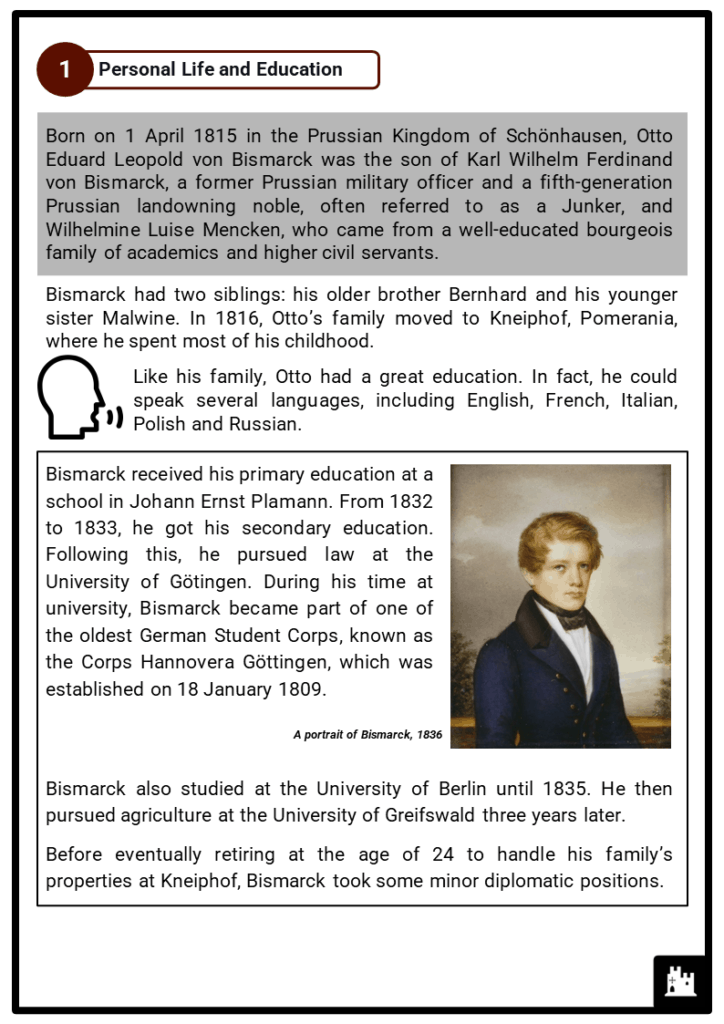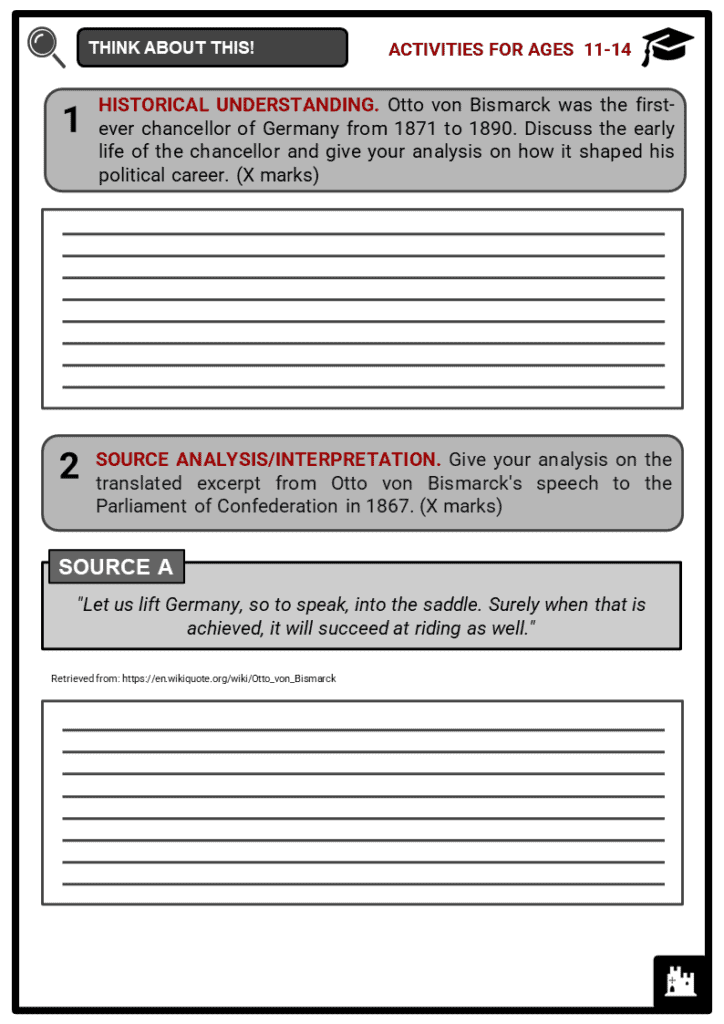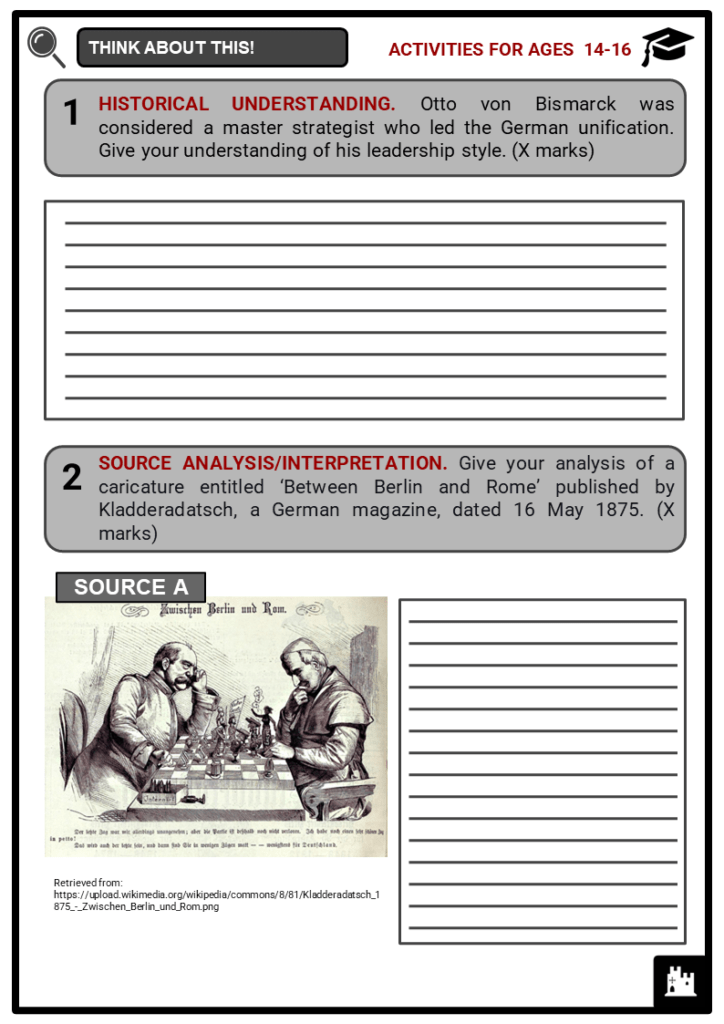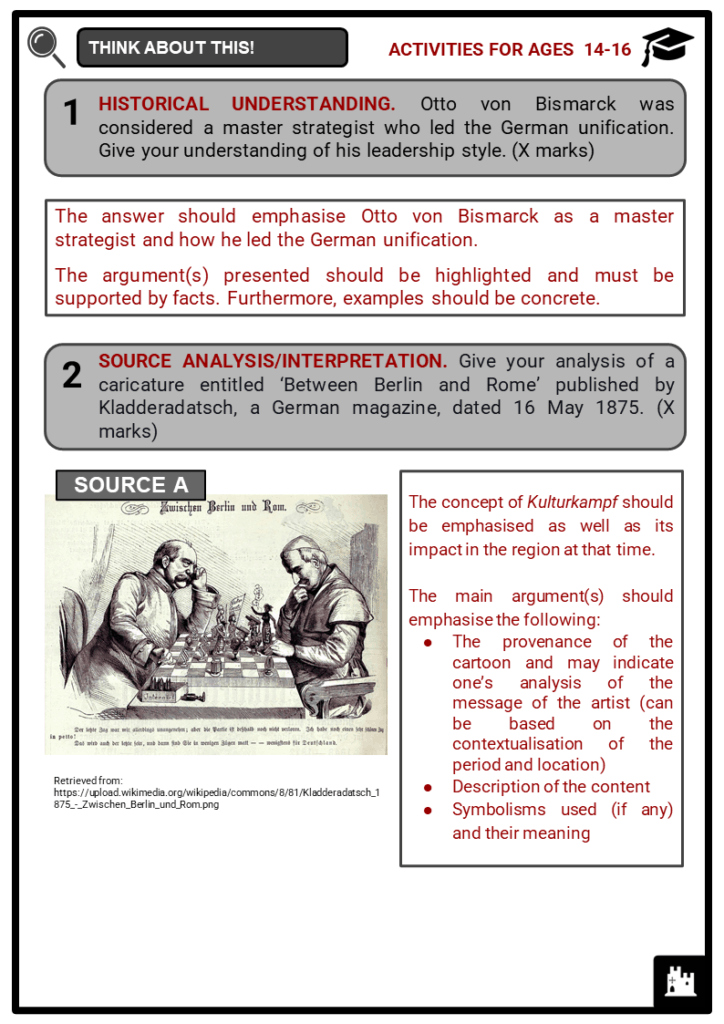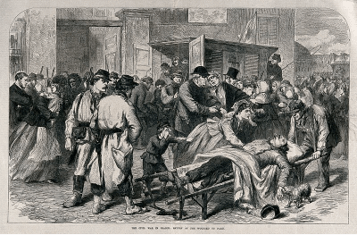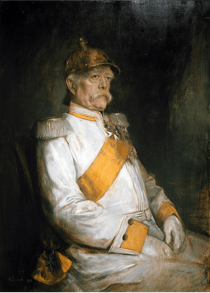Download Otto von Bismarck Worksheets
Do you want to save dozens of hours in time? Get your evenings and weekends back? Be able to teach Otto von Bismarck to your students?
Our worksheet bundle includes a fact file and printable worksheets and student activities. Perfect for both the classroom and homeschooling!
Table of Contents
Add a header to begin generating the table of contents
Summary
- The early life and educational background of Otto von Bismarck.
- The highlights of the political career of Otto von Bismarck.
- The significance of Otto von Bismarck in shaping the history of Germany.
Key Facts And Information
Let’s find out more about Otto von Bismarck!
- Serving as the first-ever chancellor of Germany from 1871 to 1890, Otto von Bismarck was considered a master strategist who led the German unification. Under his Prussian leadership, Bismarck was able to unite 39 independent German states after engaging and ruling many remarkable wars against Denmark, Austria and France. Even though Bismarck became victorious in manipulating other European nations to place Germany in position as a world power and maintain the short-lived peace in the region, he eventually set the stage for both World Wars.
Personal Life and Education
- Born on 1 April 1815 in the Prussian Kingdom of Schönhausen, Otto Eduard Leopold von Bismarck was the son of Karl Wilhelm Ferdinand von Bismarck, a former Prussian military officer and a fifth-generation Prussian landowning noble, often referred to as a Junker, and Wilhelmine Luise Mencken, who came from a well-educated bourgeois family of academics and higher civil servants.
- Bismarck had two siblings: his older brother Bernhard and his younger sister Malwine. In 1816, Otto’s family moved to Kneiphof, Pomerania, where he spent most of his childhood.
- Like his family, Otto had a great education. In fact, he could speak several languages, including English, French, Italian, Polish and Russian.
- Bismarck received his primary education at a school in Johann Ernst Plamann. From 1832 to 1833, he got his secondary education. Following this, he pursued law at the University of Götingen. During his time at university, Bismarck became part of one of the oldest German Student Corps, known as the Corps Hannovera Göttingen, which was established on 18 January 1809.
- Bismarck also studied at the University of Berlin until 1835. He then pursued agriculture at the University of Greifswald three years later.
- Before eventually retiring at the age of 24 to handle his family’s properties at Kneiphof, Bismarck took some minor diplomatic positions.
- By 1847, Bismarck was married. He likewise became a representative to the new Prussian government at the time, establishing himself as a reactionary voice against the Revolutions of 1848, which forwarded anti-autocratic and liberal ideas.
- Moreover, Bismarck became an ambassador at the German Confederation in Frankfurt, St. Petersburg and Paris between 1851 and 1862. These ambassadorships helped him observe and realise the weaknesses of powerful European nations.
The Iron Chancellor
- When William I was hailed as the King of Prussia in 1861, he then appointed Bismarck as his chief minister. Even though Bismarck was technically under the power of William, he manipulated the king and got around the influence of elected officials via royal decrees.
- In order to establish a strong Prussian power across Europe, Bismarck launched a series of definitive wars beginning in 1864.
- With the aim of seizing Schleswig-Holstein, German-speaking territories, Bismarck attacked Denmark, thus provoking Emperor Franz-Josef I and instigating the Austro-Prussian War two years later.
- The Austrians eventually lost the war, but without any war indemnity from the Prussian government.
- Bismarck also initiated the Franco-Prussian War that took place in 1870-1871 after editing a letter from William I to create tension between France and Prussia. The French then waged a war, but the Prussians, alongside their German allies, emerged victoriously.
- Consequently, Prussia imposed a war indemnity, capturing the French provinces of Alsace and Lorraine. In the Hall of Mirrors at the Palace of Versailles, William was hailed as the emperor of a united Germany, which was a huge affront to the French.
- Following the unification of Germany in 1871, Bismarck was promoted to the rank of Prince (in German: Fürst). He also became the first-ever Imperial Chancellor of the German Empire. Bismarck likewise maintained his posts as the Minister-President and Foreign Minister of Prussia.
- To further establish Germany’s power, Bismarck started a cultural struggle against Catholics, known as the Kulturkampf. About 36 per cent of the German population were Catholics at the time. Bismarck then removed Jesuits and put state control over parochial institutions.
- However, the campaign only lasted until 1878 since Bismarck needed to side with the Catholics to fight the emerging socialist threat by establishing the first modern welfare state in Europe, thereby creating national healthcare in 1883, accident insurance in 1884, and old-age pensions in 1889.
- Additionally, the German chancellor headed the Berlin Conference in 1885, which put an end to the ‘Scramble for Africa’. This resulted in the continent’s division between the ruling powers in Europe and the establishment of German colonial territories in Cameroon, Togoland and East and Southwest Africa.
Final Years
- After the death of William I in 1888, his son Frederick III became his successor. However, Frederick was already terminally ill at the time and his rule only lasted for 99 days.
- William II succeeded Frederick, and Bismarck had a difficult time with the new king, as he contradicted the German chancellor’s foreign policy. This eventually led to the resignation of Bismarck on 18 March 1890, at age 75. Prussian Minister-President Leo von Caprivi took Bismarck’s post.
- Consequently, William II was left in charge of a thriving unified Germany, but he lacked the necessary skills to sustain the country’s relations with other European powers.
- In his final years, Bismarck was able to write his memoirs, known as Thoughts and Memories, or Gedanken und Erinnerungen.
- After being diagnosed with gangrene in his foot in 1896, Bismarck eventually fell ill. He died on 30 July 1898.
- Across the former German Empire, several monuments were built in his honour, including the famed Bismarck Towers.
Image sources:
- https://commons.wikimedia.org/wiki/File:Berlin,_Alte_Nationalgalerie,_Franz_von_Lenbach,_Otto_von_Bismarck.JPG
- https://commons.wikimedia.org/wiki/File:Franco-Prussian_War;_Civil_unrest_in_Paris._Wood_engraving_a_Wellcome_V0015461.jpg
- https://upload.wikimedia.org/wikipedia/commons/thumb/7/7c/Franz_von_Lenbach_-_Portrait_of_Otto_Eduard_Leopold_von_Bismarck_-_Walters_371007_-_View_B.jpg/800px-Franz_von_Lenbach_-_Portrait_of_Otto_Eduard_Leopold_von_Bismarck_-_Walters_371007_-_View_B.jpg


